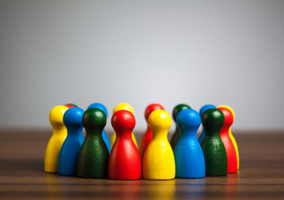Collective intelligence is when a group of diverse people work together, often with the help of technology, to mobilise a wider range of information, ideas and insights in order to solve a problem.
This can be a key tool for decision-making and we see it in operation every day in charities and social enterprises. It feels intuitive that the additional information, experts and ideas provided by a group of people would have advantages over an individual decision maker however, this isn’t always as easy as it sounds and there’s little guidance to help leaders do it effectively.
Economic forecasts are used by charities and social enterprises to inform strategy and predict demand for their services. Typically, third sector leaders rely on forecasts made by individual economists or some combination of individuals. But in 2019 researchers showed that even an economist with a good historical record cannot outperform the simple average of their peers. In other words, the aggregate forecasts of a group of economists, known as the “wisdom of crowds”, are consistently more accurate than any individual’s estimate.
When it comes to geopolitical forecasting it's been shown that even groups of non-experts can outperform individual professionals. So while it's tempting to look to external experts, sometimes the intelligence you need might be about drawing on forecasts from different colleagues instead.
Despite the proven potential of group decision-making, the majority of research on decision-making tends to focus on the individual rather than exploring how teams and organisations make decisions. As the third sector begins to develop new ways of responding to the crisis caused by the Covid-19 pandemic, how can organisations ensure they use collective intelligence as a tool to make the right solutions and develop the right decisions?
1. Diversity is key
Diversity leads to better problem solving and decision making in groups. Team members should be diverse in terms of identity, demographics and approaches to problem solving, as well as having different levels of experience and expertise represented.
Groups made up of solely high-status or high-performing individuals find it difficult to collaborate, share information less effectively and struggle to stay focused on the task. In contrast, for well-constructed mixed ability teams the skills gap can be a powerful motivator for less able members, leading to overall productivity gains for the team.
Training can help here. For leaders and managers at charities and social enterprises it could be particularly useful to focus on developing cross-cutting skills within teams. For example, training to help individuals cultivate actively open minded thinking (AOMT), probabilistic reasoning, and perspective taking.
Not only do these three skills help increase a team’s collective intelligence, they are widely transferable, leading to teams that are better at problem solving overall. Groups with high cognitive flexibility or AOMT can adapt quickly and make better-informed decisions, while having the ability to accurately estimate future outcomes to help correct for assumptions.
2. Set a decision rule
For any decision-making process to work teams need to agree on a decision rule – the method used to make the final decision. There are a number of “decision rules” teams can explore from “consensus”, where everyone agrees, “democratic”, where majority goes or “consultation”, where you gather evidence.
The main thing to remember is to choose your approach before you start and to make sure everyone involved knows what their role is. The choice of decision rule depends on the priorities of the group, as well as time and resourcing. It’s not always efficient for teams to push themselves to find the optimal solution or group consensus, and in many cases they don’t need to.
3. Work with uncertainty
For charities and social enterprises, as with everyone, the past year has increased the level of uncertainty they must operate in. But even as we look forward to a post-pandemic world, it’s impossible to avoid uncertainty when it comes to strategic decisions.
The first step in managing uncertainty is acknowledging that it exists and understanding what is causing it. Uncertainty can interfere with the ability of the group to make the best decision in the present moment, for example if the group doesn’t have access to accurate or up-to-date data about an issue.
Collective intelligence methods like crowdsourcing allow leaders to tap into new sources of information about a problem in real-time. For example, the Covid Tracking project in the United States relied on hundreds of volunteers to create the most complete dataset about Covid-19 in the US. In the UK, data collected through the citizen science project ZOE has been used by the government to identify new hotspots in near real-time.
Groups should identify the sources of both current and future uncertainty before deciding whether to try reducing the unknowns, delay the decision or ignore the uncertainty, depending on the level of risk. Try to quantify the level and source of uncertainty.
For example, are you missing data or is the evidence you’ve gathered unreliable in some way? Then discuss if the uncertainty is significant enough to warrant further attention. Groups should ask “would perfect information change the decision?” But groups should be careful to include diverse viewpoints when they consider this question, otherwise the natural bias to reduce uncertainty, known as “the need for closure”, may lead them to a premature decision.
How To Make Good Group Decisions is a new report by Nesta’s Centre for Collective Intelligence Design. The resource provides practical tips on how to make the most of group decision-making. Tapping into the collective intelligence of groups can inspire new ways to solve problems and make a big difference to ways of working, especially when budgets and resources are more constrained than ever.
Aleks Berditchevskaia is the principal researcher at Nesta’s Centre for Collective Intelligence Design
Related articles












